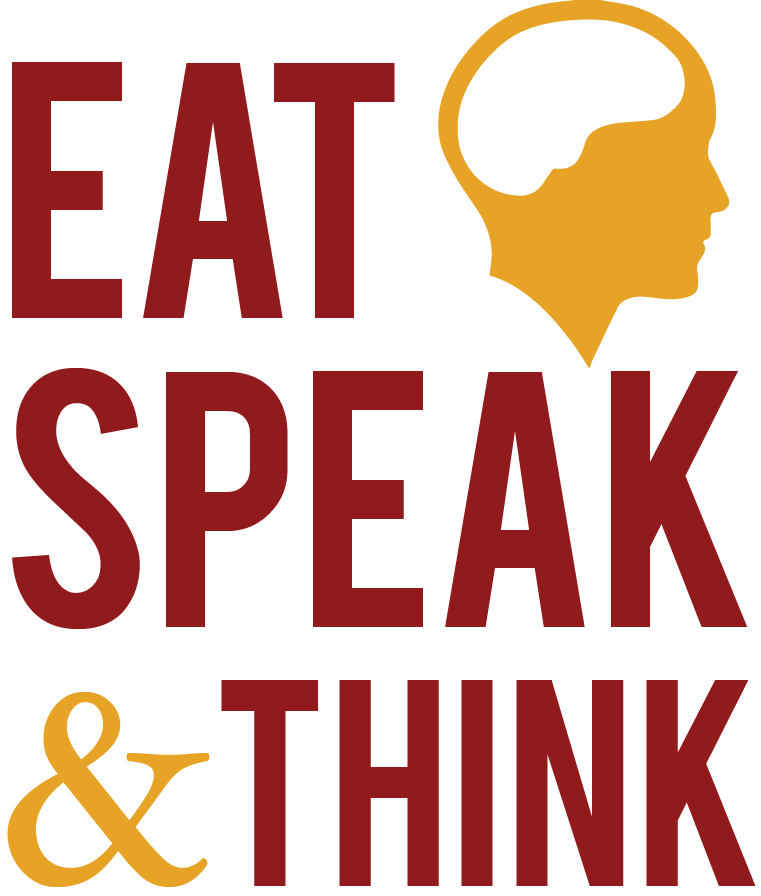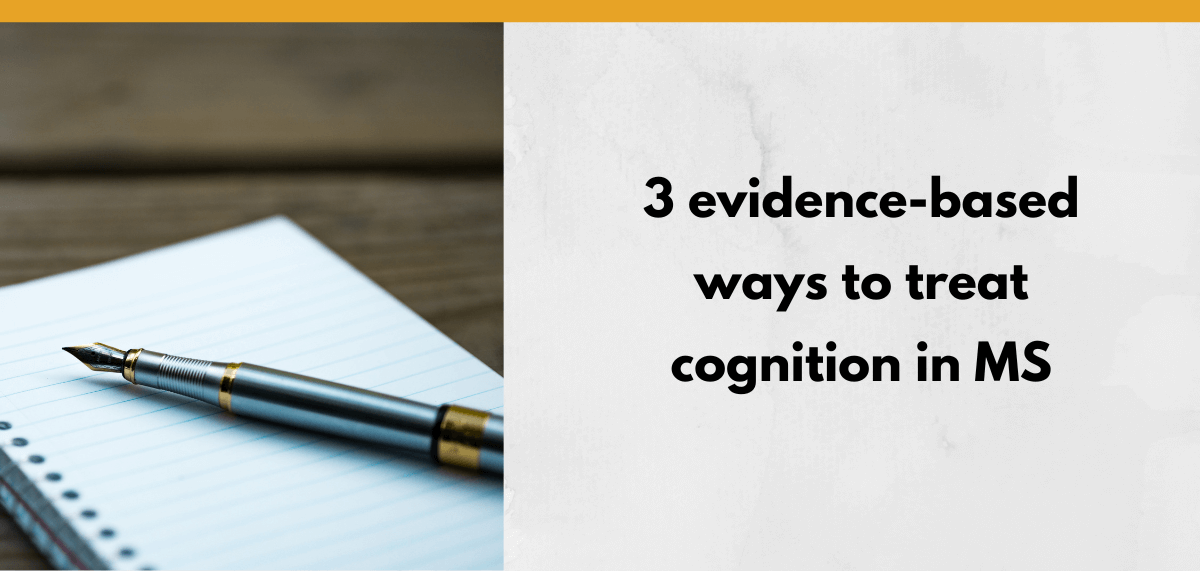More than half of adults with multiple sclerosis (MS) develop cognitive impairment. Here you can learn about three evidence-based ways to treat cognition in MS.
Outline:
- Fast facts about cognition in MS.
- Ways to treat cognition in MS.
- The modified Story Memory Technique (mSMT).
- Self-generation.
- Spaced learning and spaced retrieval.
- Related Eat, Speak, & Think posts.
Fast facts about cognition in MS
Here are some facts about cognition from the National MS Society:
- More than 50% of people with MS develop problems with cognition.
- Cognition typically changes slowly.
- Early changes are often blamed on being busy/stressed.
- More likely to experience changes during exacerbations.
- Cognitive impairment is more likely with Primary Progressive and Secondary Progressive subtypes, but can occur with any type of MS.
Wilken et al (2003) and Rao et al (1991) discuss specific signs of impairment:
- Forgetfulness.
- Easily distracted.
- Performs tasks more slowly.
- Difficulty multitasking or shifting attention.
- Trouble solving problems, mental rigidity.
- Impaired visual perception and hand-eye coordination.
Ways to treat cognition in MS
Rosalind Kalb and colleagues published Recommendations for cognitive screening and management in multiple sclerosis care. This article has great information, including a table of treatment modalities for cognitive impairment (p. 13).
These are the treatment modalities I’ll describe in this post:
- The modified Story Memory Technique (mSMT).
- Self-generation.
- Spaced learning and spaced retrieval.
The modified Story Memory Technique (mSMT)
The modified Story Memory Technique (mSMT) is a therapy program that has been (or is being) tested in people with multiple sclerosis (MS), Traumatic Brain Injury, and Alzheimer’s.
This work is headed up by Dr. Nancy D. Chiaravolloti and colleagues. The key principle of the mSMT is to encode information by tapping into the semantic and visual systems of the brain.
The 10-session program is described in this presentation (Treating New Learning and Memory Deficits in Rehabilitation Populations: the modified Story Memory Technique), starting on slide 39.
The first four sessions focus on teaching how to use imagery, using written stories with key words highlighted. The client forms mental images representing chunks of the story in order to remember the key words.
Sessions 5-8 focus on teaching how to generate one’s own context for a list of words to remember. The client creates an easy-to-visualize story using the list of words. In this way, they are learning to use imagery and context to encode information in a personally-meaningful way.
The final two sessions focus on using these memory strategies for everyday information that the client might want to remember.
Dr. Chiaravolloti gave a TEDx talk in which she described how this technique works. You can watch to learn more.
Self-generation
Yael Goverover and colleagues published a randomized controlled trial in 2017 investigation self-generation as a memory technique for people with MS. This research further investigated the earlier finding that people remember information better if they generate it themselves.
Participants practiced using the strategy with:
- Words within sentences.
- Paired associated words.
- Names.
- Dates, appointments, and object locations.
- Cooking and finances.
- Personal choice such as creating an email account, storing information on an i-Cloud, or learning a new language.
Participants in the treatment group were given a sentence, word pair, or picture. However, the key word or item to be remembered was missing. Participants were asked to come up with a logical word or item and remember it.
They were then given given similar materials in which the words/items to be remembered were provided. They were asked to remember the underlined words or objects.
The participants were then able to predict which set of materials they thought they’d remember better.
Our patients might find it enlightening to do a memory exercise under both conditions (self-generation vs provided). They could see for themselves that they may remember better if they generate their own information to remember.
Spaced learning and spaced retrieval
Goverover et al (2011) examined spaced learning, massed practice, and self-generation in people with MS. The participants practiced remembering names, appointments, and object locations. They were tested immediately and again after 30 minutes.
The researchers found that spaced learning was more beneficial than massed practice. They also found that spaced learning and self-generation combined were more effective than spaced retrieval alone.
I’m not able to access this article to see how the spaced learning was set up, but the idea seems to be that a person would read the information at intervals, rather than repeated immediately.
Sumowski et al (2010) found that spaced retrieval was more effective than spaced learning in people with MS. In other words, testing for recall at spaced intervals was more effective than being exposed to the information at spaced intervals.
If your patient has difficulty learning information with unstructured spaced retrieval, you may wish to follow a structured approach such as the one I wrote this tutorial about.
Related Eat, Speak, & Think posts
- How to improve short term memory.
- 5 easy steps to remember names.
- How to improve cognition in multiple sclerosis.
- How to use spaced retrieval with errorless learning to improve memory.
Featured image by Pexels–2286921 from pixabay.
Lisa earned her M.A. in Speech-Language Pathology from the University of Maryland, College Park and her M.A. in Linguistics from the University of California, San Diego.
She participated in research studies with the National Institute on Deafness and other Communication Disorders (NIDCD) and the University of Maryland in the areas of aphasia, Parkinson’s Disease, epilepsy, and fluency disorders.
Lisa has been working as a medical speech-language pathologist since 2008. She has a strong passion for evidence-based assessment and therapy, having earned five ASHA Awards for Professional Participation in Continuing Education.
She launched EatSpeakThink.com in June 2018 to help other clinicians be more successful working in home health, as well as to provide strategies and resources to people living with problems eating, speaking, or thinking.



Be First to Comment